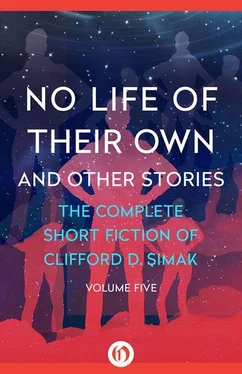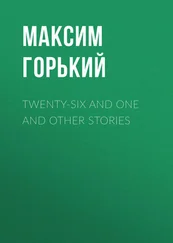And, yet, within his mind, if not within his ears, he still could hear the creaking of the rocker, moving back and forth within that room where a bygone gentility warred against the brusqueness of present time. The fireplace was built of rosy brick, with white paneling placed around the brick, the mantel loaded with old figurines, with framed photographs from another time, with an ornate, squatty clock that chimed each quarter hour. There had been furniture of solid oak, a threadbare carpet on the floor. The drapes at the large bow windows, with deep window seats, were of some heavy material, faded over the years to a nondeterminate coloring. Paintings with heavy gilt frames hung on the walls, but the gloom within the room was so deep that there was no way of seeing what they were.
The woman-of-all-work, the companion, the housekeeper, the practical nurse, the cook, brought in the tea, with bread-and-butter sandwiches piled on one plate and delicate cakes ranged on another. She had set the tray on the table in front of the rocking old lady and then had gone away, back into the dark and mysterious depths of the ancient house.
The old lady spoke in her brittle voice, “Thomas,” she said, “if you will pour. Two lumps for me, no cream.”
Awkwardly, he had risen from the horsehair chair. Awkwardly he had poured. He had never poured before. There was a feeling that he should do it charmingly and delicately and with a certain genteel flair, but he did not have the flair. He had nothing that this house or this old lady had. His was another world.
He had been summoned here, imperatively summoned, in a crisp little note on paper that had a faint scent of lavender, the script of the writing more bold than he would have expected, the letters a flowing dignity in old copperplate.
I shall expect you , she had written, on the afternoon of the 17th. We have matters to discuss.
A summons from the past and from seven hundred miles away and he had responded, driving his beaten-up, weather-stained, lumbering camper through the flaming hills of a New England autumn.
The wind still tugged and pushed at him, the windmill blades still a swirl of movement and below him, above the river, the small, dark shape of the circling hawk. Autumn then, he told himself, and here another autumn, with the trees of the river valley, the trees of other far-off vistas, taking on the color of the season.
The ridge itself was bare of trees, except for a few that still clustered around the sites of homesteads, the homesteads now gone, burned down or weathered away or fallen with the passage of the years. In time long past, there might have been trees, but more than a hundred years ago, if there had been any, they had fallen to the ax to clear the land for fields. The fields were still here, but no longer fields; they had known no plow for decades.
He stood at the end of the ridge and looked back across it, seeing all the miles he had tramped that day, exploring it, getting to know it, although why he felt he should get to know it, he did not understand. But there was some sort of strange compulsion within him that, until this moment, he had not even questioned.
Ancestors of his had trod this land, had lived on it and slept on it, had procreated on it, had known it as he, in a few short days, would never know it. Had known it and had left. Fleeing from some undefinable thing. And that was wrong, he told himself, that was very wrong. The information he’d been given had been somehow garbled. There was nothing here to flee from. Rather, there was something here to live for, to stay for—the closeness to the sky, the cleansing action of the wind, the feeling of intimacy with the soil, the stone, the air, the storm, the very sky itself.
Here his ancestors had walked the land, the last of many who had walked it. For millions of years unknown, perhaps unsuspected, creatures had walked along this ridge. The land was unchanging, geologically ancient, a sentinel of land standing as a milepost amidst other lands that had been forever changing. No great mountain-building surges had distorted it, no glacial action had ground it down, no intercontinental seas had crept over it. For hundreds of millions of years, it had been a freestanding land. It had stayed as it was through all that time, with only the slow and subtle changes brought about by weathering.
He had sat in that room from out of the past and across the table from him had been the rocking woman, rocking even as she drank the tea and nibbled at the bread-and-butter sandwich.
“Thomas,” she had said, speaking in her old brittle voice, “I have a job for you to do. It’s a job that you must do, that only you can do. It’s something that’s important to me.”
Important to her. Not to someone else, to no one else but her. It made no difference to whom else it might be important or unimportant. To her, it was important and that was all that counted.
He said, amused at her, at her rocking and her intensity, the amusement struggling up through the out-of-placeness of the room, the woman and the house, “Yes, Auntie, what kind of job? If it’s one that I can do …”
“You can do it,” she said, tartly. “Thomas, don’t get cute with me. It’s something you can do. I want you to write a history of our family, of our branch of the Parkers. I am aware there are many Parkers in the world, but it’s our direct line in which my interest lies. You can ignore all collateral branches.”
He had stuttered at the thought. “But, Auntie, that would take a long time. It might take years.”
“I’ll pay you for your time,” she’d said. “You write books about other things. Why not about the family? You’ve just finished a book about paleontology. You spent three years or more on that. You’ve written books on archaeology, on the old Egyptians, on the ancient trade routes of the world. Even a book on old folklore and superstitions and, if you don’t mind my saying so, that was the silliest book I ever read. Popular science, you call it, but it takes a lot of work. You talk to many different people, you dig into dusty records. You could do as much for me.”
“But there’d be no market for such a book. No one would be interested.”
“I would be interested,” she said sharply, the brittle voice cracking. “And who said anything about publication? I simply want to know. I want to know, Thomas, where we came from and who we are and what kind of folks we are. I’ll pay you for the job. I’ll insist on paying you. I’ll pay you …”
And she named a sum that quite took his breath away. He had never dreamed she had that kind of money.
“And expenses,” she said. “You must keep a very close accounting of everything you spend.”
He tried to be gentle with her, for quite obviously she was mad. “But, Auntie, you can get it at a much cheaper figure. There are genealogy people who make a business of tracing back old family histories.”
She sniffed at him. “I’ve had them do the tracing. I’ll give you what I have. That should make it easier for you.”
“But if you have that—”
“I suspect what they have told me. The record is unclear. To my mind, it is. They try too hard to give you something for your money. They set out to please you. They gild the lily, Thomas. They tell about the manor house in Shropshire, but I’m not sure there ever was a manor house. It sounds just a bit too pat. I want to know if there ever was or not. There was a merchant in London. He dealt in cutlery, they say. That’s not enough for me; I must know more of him. Even in our New England, the record is a fuzzy one. Another thing, Thomas. There are no horse thieves mentioned. There are no gallows birds. If there are horse thieves and gallows birds, I want to know of them.”
Читать дальше












